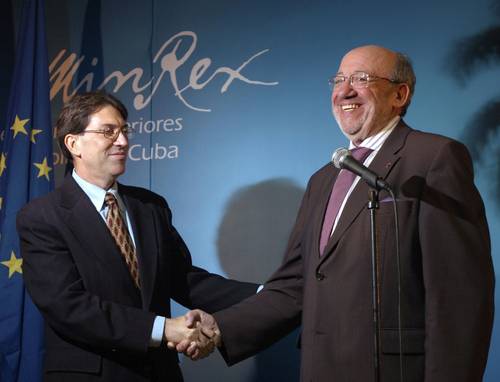
"Suficiente", la información difundida sobre la destitución de ambos funcionarios, dice
"compañeros"Pérez Roque y Lage
aún militan en el PCC: canciller cubano
 Saludo
entre el ministro del Exterior cubano, Bruno Rodríguez (a la
izquierda), y el belga Louis Michel, comisario de la Unión
Europea para el Desarrollo y la Ayuda Humanitaria, que está
de visita en Cuba para participar en una conferencia de
cooperación con la isla Foto Reuters
Saludo
entre el ministro del Exterior cubano, Bruno Rodríguez (a la
izquierda), y el belga Louis Michel, comisario de la Unión
Europea para el Desarrollo y la Ayuda Humanitaria, que está
de visita en Cuba para participar en una conferencia de
cooperación con la isla Foto Reuters
La Habana, 18 de marzo.
El canciller Bruno Rodríguez llamó hoy
compañeros
a su antecesor, Felipe Pérez Roque, y al ex
vicepresidente Carlos Lage; dijo que aún son militantes del
Partido Comunista de Cuba (PCC) y afirmó que es suficiente
la información oficial difundida sobre la destitución de ambos y
de otros altos funcionarios a principios de este mes.
Rodríguez ofreció hoy su primera conferencia de prensa como ministro de Relaciones Exteriores. Lo hizo acompañado del belga Louis Michel, comisario de la Unión Europea (UE) para el Desarrollo y la Ayuda Humanitaria, quien realiza una visita de trabajo.
En respuesta a una pregunta sobre las causas de la destitución de Pérez Roque, Rodríguez recordó la nota oficial del 2 de marzo que reportó el cese de diez altos funcionarios y el artículo de Fidel Castro del día siguiente.
Luego, sin mencionar a Lage, citó
también como referencia las cartas de renuncia de dichos
compañeros, que fueron publicadas en nuestra prensa
.
Conozco que ha habido
muchas especulaciones, como siempre ocurre
,
dijo Rodríguez, quien es miembro del Comité Central del PCC.
Puedo decir que ellos siguen militando en nuestro partido y que
los documentos, las publicaciones a las que me he referido,
contienen información oficial y suficiente
.
La nota del 2 de marzo no
señalaba causas particulares de los ceses, aunque explicaba el
movimiento como parte del plan oficial de reducir la alta
burocracia, mejorar su funcionamiento y trabajar por la
institucionalidad
del gobierno.
Al día siguiente, el artículo de
Castro incluyó este párrafo acusatorio contra Lage y Pérez Roque:
La miel del poder por el cual no conocieron sacrificio alguno,
despertó en ellos ambiciones que los condujeron a un papel
indigno. El enemigo externo se llenó de ilusiones con ellos
.
Los originales de las renuncias
fueron publicadas en la prensa del jueves 5, aunque están
fechadas el martes 3, cuando apareció el artículo de Castro. En
esas cartas de estructura idéntica, ambos reconocen errores
,
pero hasta ahora se desconoce cuáles son esas faltas y cómo se
manifiestan las acusaciones de Castro.
La declaración de Rodríguez es la primera de un funcionario sobre el asunto. Los medios locales han guardado silencio sobre el caso y hasta ahora sólo se conoce de fuente oficial los textos citados por el canciller: la nota oficial, el artículo de Castro y las renuncias de Lage y Pérez Roque.
El ex canciller renunció como integrante del Comité Central, diputado y miembro del Consejo de Estado.
Rodríguez subrayó que, después de
esos movimientos, en la política exterior cubana no hay
absolutamente ningún cambio, sino la continuidad
de la misma
línea desde 1959.
Michel, un veterano de las
relaciones con Cuba, que ahora es la cara visible de la UE en el
trabajo de filigrana que ambas partes ejecutan para normalizar
relaciones, confirmó que no existen cambios fundamentales
en el trato con la isla.
Hay la misma voluntad de
construcción de un capital de confianza
, así como la
misma buena voluntad, el mismo carácter positivo y el mismo
calor cubano clásico. En el fondo no ha habido cambios
, dijo
el comisario.
En el estilo sí se notó el cambio. Rodríguez es ecuánime y pausado y va directamente al punto de lo que quiere decir. Pérez Roque fácilmente subía el tono de voz, con el perfil de un orador de tribuna, y daba varias vueltas sobre un asunto.
Pero el canciller actual y el anterior se parecen en la capacidad de reacción. Rodríguez corrigió a Michel, al desmentir que Cuba hubiera manifestado disposición para dialogar sobre su sistema penitenciario, como había dicho minutos antes el comisario europeo.
Y aunque Cuba se mantiene abierta
a dialogar sobre cualquier tema, incluso el de derechos humanos,
no ha expresado ninguna posición
sobre hablar de sus
cárceles, lo que pertenece al fuero interno
de cada país,
apuntó el canciller.
Michel vino para participar en una conferencia de cooperación con Cuba, como parte del proceso para remontar el choque abierto en 2003 por la detención masiva de opositores y el fusilamiento de tres secuestradores en la isla.
En mayo trabajará en Bruselas a nivel de cancilleres el mecanismo de diálogo político bilateral, reabierto en octubre pasado. El paquete de cooperación, que Cuba había rechazado en 2003, en medio de la crisis, ahora se eleva a 40 millones de euros (52 millones de dólares).